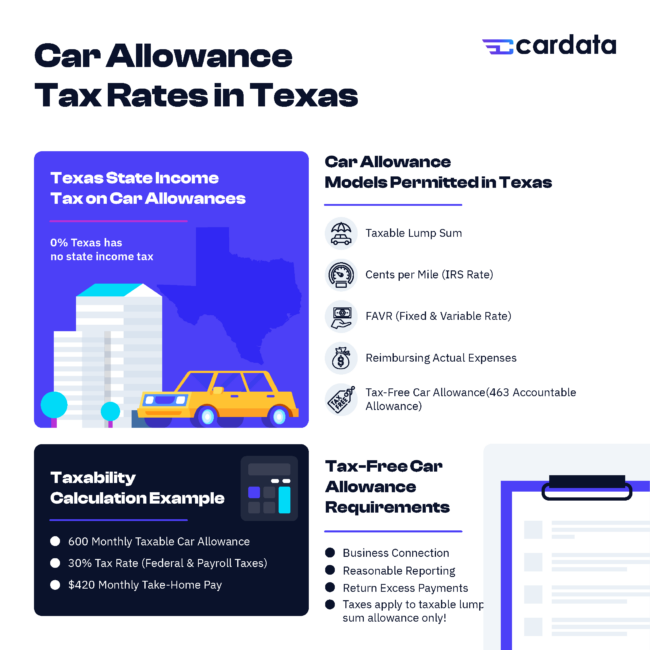Follow us on LinkedIn
Our PageWhat is a mileage reimbursement?
A mileage reimbursement is a form of repayment given to employees for the use of their personal vehicle when it is used for business purposes. It covers the cost of fuel, maintenance, insurance, and other associated expenses. By offering this type of reimbursement, companies can help defray the cost of running an employee’s vehicle while also encouraging them to use their own car instead of company vehicles. This can be especially beneficial when traveling long distances or visiting multiple locations on business trips.

Mileage reimbursements come in many different forms, from IRS standard rate, to tax-free car allowance, to FAVR. To learn all about mileage reimbursements, read our 2023 guide, next:
Cardata | The Ultimate Guide to Mileage Reimbursement for
What is the Texas mileage reimbursement rate in 2023?
Under Texas business travel regulations, there is no specific mileage reimbursement rate. However, certain organizations within Texas follow the IRS maximum reimbursement rate—in 2023, 65.5¢ per mile—as a guide maximum deductible mileage reimbursement. Employees of Texas companies can also deduct this maximum reimbursement from their income on the Federal income tax returns.
Texas government code does not stipulate universal rules for how to reimburse employees who use their personal vehicles for work. Many companies, however, choose to offer reimbursements to their teams.
What is the IRS 2023 mileage rate?
The Federal, IRS 2023 mileage rate is 65.5¢ per mile. There are secondary rates for medical and moving, and charitable driving. Those are 22 and 14 cents respectively.
If you’d like to learn more about the IRS standard rate, check out our blog on the subject.
Tracking Mileage Reimbursement
One of the core IRS rules for all forms of mileage reimbursement, is that expenses be substantiated in some way. The primary method of substantiating business driving expenses is tracking mileage—with a logbook, a spreadsheet, or an app. Below, we have provided our readers with an online, copiable spreadsheet that they can use to track mileage right away. Additionally, see our mileage app for business mileage reimbursement programs.
Calculating Mileage Reimbursement
There are a few different ways to calculate mileage reimbursement. The easiest way is to just record mileage and pay the Federal rate of 65.5¢ per mile. However, this method is not financially advantageous to either party, business or employee. So people calculate using other methods, like FAVR or accountable allowance. These methods, like the IRS rate, are tax-free and IRS-compliant. Reimbursement Programs can be profitable for teams and companies, so it’s worth looking into your options.
Read more about calculating FAVR here
Read more about accountable allowances here
Mileage Reimbursement Spreadsheet Resource
Need a quick sheet with which to start tracking business miles? Just go here and hit file > make a copy.
Texas Average Mileage Reimbursement Rates
The average total mileage reimbursement in Texas is lower than the national average of $600. The regional average in the South is $560.
YMMV — Your Mileage May Vary: every company and industry is different, and mileage reimbursement programs are accurate — that’s how they’re designed! Don’t worry if your mileage reimbursement is higher or lower than the national or regional average.
Texas Mileage Reimbursement Tax Laws
In Texas, as elsewhere, tax-laws favor companies and their employees who drive for work. You are able to completely deduct business mileage from payroll and income tax. With a company vehicle reimbursement program, mileage reimbursements can go out untaxed, separate from paychecks. Alternatively, employees can track their own miles and report them on their taxes to receive a deduction.
Texas Mileage Reimbursement Labor Laws
Does Texas require employers to reimburse for mileage?
No. However, many employers choose to offer reimbursement for mileage. There are some organizations that have policies around mileage reimbursement, including State of Texas and Texas State University employees.
State employees in Texas are entitled to a mileage reimbursement if they use their personal vehicle for work, but employees of most businesses are not entitled to mileage reimbursements.
Texas State University, for example, also has a mileage reimbursement code. They follow the IRS maximum travel reimbursement rates for 2023. Under this provision, employees can receive up to 65.5¢ (2023) as tax-free reimbursement for mileage expenses. Any sum over that maximum is taxed, unless you’re on a fixed and variable rate (FAVR) plan.
Can an employer refuse to reimburse expenses in Texas?
Your organization may have a mileage reimbursement arrangement, such as a tax-free car allowance. However, this isn’t necessarily the case. In Texas, employers do not have to reimburse employees for travel expenses, except in one case. If the incurred work-related expenses would render the employee’s actual wage less than Texas minimum wage, employers must reimburse the employee, according to Kell A. Simon Law.
Of course, employees are entitled to Federal tax deductions for mileage expenses. An individual may deduct the maximum IRS standard rate of 65.5¢ per mile driven. It is best to keep a mileage log as a record of your trips if you are deducting personal miles!
Haven’t implemented a VRP yet?
Your peers already have robust reimbursement programs at their employers. If you don’t have a reimbursement program in place right now, ask your manager about a car allowance. The average total mileage reimbursement in Texas is lower than the national average of $600. The regional average in the South is $560. That’s likely because gas is significantly cheaper in Texas! Speak to an expert about mileage reimbursement programs today.
Why Texas is an amazing place to reimburse for mileage
Texas is a great place to run a mileage reimbursement program, for three reasons:
- Texas law allows complete freedom in designing reimbursement programs
- Employers can use vehicle reimbursement programs as talent magnets
Texas law allows complete freedom in designing reimbursement programs
You are not bound by any regulations when it comes to designing reimbursement programs in the State of Texas, so you can offer your team as flexible or as robust a program as you want. There are a few great options for vehicle mileage reimbursement programs that you can design based on your staff’s needs:
- Tax-Free Car Allowance Mileage Reimbursements
- Fixed and Variable Rate FAVR car allowances
- Cents per Mile Mileage Reimbursements
Employers can use vehicle reimbursement programs as talent magnets
The right mileage reimbursement program is a complement to your existing total rewards packages. If your team drives their personal cars for work, you might want to consider this offering. Giving your team a tax-free subsidy for a motor vehicle goes a long way in motivating top talent to join your organization. Read these articles to learn the great benefits of offering a vehicle reimbursement program:
- Tax-Free Car Allowances Attract Sales Talent
- How HR managers benefit from outsourced mileage reimbursement programs
Texas Mileage Reimbursement FAQs
What is the 2023 mileage reimbursement rate in Texas?
There is no specific rate, however the Federal rate of 65.5¢ is used broadly.
What is the Texas reimbursement policy?
No state-wide policy exists. There are exceptions. State employees are entitled to receive the Federal rate (65.5¢) and some other organizations mandate this also. These policies are unique to the organizations and not mandated universally.
Is mileage reimbursement required in Texas?
No. Companies do not have to issue mileage reimbursements.
When should a Texas employer reimburse for mileage?
Texas companies can use their discretion. However, top talent is often attracted by alluring car allowance programs.
Further Reading
If you want to learn more about mileage reimbursement in different states, we’ve done the top ten here:
US State Mileage Reimbursement Rules | Cardata
Don’t see your state? Don’t worry, we’re working on it. We’ll cover every state as soon as we can!
Disclaimer: nothing contained in this blog post is legal or accounting advice. Consult your lawyer or accountant and do not rely on the information contained herein for any business or personal financial or legal decision making. While we strive to be as reliable as possible, we are neither lawyers nor accountants. For several citations of IRS publications, on which we base our blog content ideas, please always consult this article: https://www.cardata.co/blog/irs-rules-for-mileage-reimbursements. For Cardata’s terms of service, go here: https://www.cardata.co/terms.
Share on:



